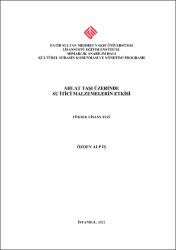| dc.contributor.advisor | Dabanlı, Ömer | |
| dc.contributor.author | İş, Özden Alp | |
| dc.date.accessioned | 2021-10-14T10:45:28Z | |
| dc.date.available | 2021-10-14T10:45:28Z | |
| dc.date.issued | 2021 | en_US |
| dc.identifier.citation | İŞ, Özden Alp, Ahlat Taşı Üzerinde Su İtici Malzemelerin Etkisi, Fatih Sultan Mehmet Vakıf Üniversitesi Lisansüstü Eğitim Enstitüsü Mimarlık Anabilim Dalı Kültürel Mirasın Korunması ve Yönetimi Programı, Yayımlanmamış Yüksek Lisans Tezi, İstanbul 2021. | en_US |
| dc.identifier.uri | https://hdl.handle.net/11352/3959 | |
| dc.description.abstract | Tarihi yapılarda doğal taş kullanımı yaygın olarak görülmektedir. Bununla
birlikte bazı taş türlerinin kimyevi ve fiziki etkilere karşı dayanıklı olmadığı
bilinmektedir. Bu tür taşlarda koruyucu olarak çeşitli su itici malzemelerin
kullanılması sıklıkla gündeme gelmektedir.
Su itici malzemelerin temel işlevi suyun malzeme yüzeyine nüfuz etmesini
engellemektir. Suyun doğal taş üzerinde oluşturacağı bozulmaları, su itici uygulanarak
en aza indirilmesi veya tamamen durdurulması hedeflenir. Su iticiler taşı çevresel
etkilerden koruyarak oluşabilecek bozulmaların azalmasını sağlar.
Su itici seçiminde, su itici uygulanacak taşın özellikleri ve su itici olarak yaygın
kullanılan malzemelerin özellikleri ayrıntılı olarak bilinmelidir. Uygulanacak
özelliklerine bağlı olarak su iticinin performası değişkenlik gösterebilmektedir.Bu çalışmada, Bitlis ili, Ahlat ilçesi sınırlarındaki taş ocağından çıkarılan ve
bölgedeki tarihi yapılarda sıklıkla kullanılmış bir doğal taş olan Ahlat taşı üzerinde su
itici malzemelerin etkilerinin belirlenmesi amaçlanmaktadır.
Tezin birinci bölümünde, çalışmanın amacı, kapsamı ve yönteminden, ikinci
bölümünde, ahlat taşı ve özelliklerinden bahsedilmiştir. Üçüncü bölümde tez
kapsamında kullanılacak su itici malzemelerin karakterizasyonu ele alınmış ve SEM EDX analizi ve FTIR analizi gibi deneylerden elde edilen sonuçlar verilmiştir.
Dördüncü bölümde ahlat taşı üzerine su itici uygulaması sonrası, ağırlıkça su emme,
kılcal etkiye bağlı su emme ile su buharı geçirimliliği deneyleri yapılmış ve su itici
uygulaması yapılmamış referans örnekle karşılaştırılmıştır. Beşinci bölümde ise su
itici uygulaması yapılmış ve uygulama yapılmamış taşlar çeşitli eskitme deneylerine tabi tutulmuş ve elde edilen sonuçlar üzerinden su itici malzemelerin etklinliği
değerlendirilmiştir. | en_US |
| dc.description.abstract | The use of natural stone in historical buildings is common. However, it is
known that some stone types are not resistant to chemical and physical effects. The
use of various water-repellent materials as a preservative in such stones is often on the
agenda.
The main function of water-repellent materials is to prevent water from
penetrating the material surface. It is aimed to minimize or completely stop the
deterioration of natural stone by applying water repellent. Water repellents protect the
stone from environmental effects and reduce the deterioration.
In the selection of water repellent, the properties of the stone to which the water
repellent will be applied and the properties of the materials commonly used as water
repellent should be known in detail. Depending on the properties to be applied, the
performance of the water repellant may vary.
In this study, it is aimed to determine the effects of water-repellent materials
on Ahlat stone, which is a natural stone extracted from the quarry in the borders of
Ahlat district of Bitlis province and frequently used in historical buildings in the
region.In the first part of the thesis, the aim, scope and method of the study, and in the
second part, the Ahlat stone and its properties are mentioned. In the third chapter, the
characterization of the water-repellent materials to be used in the thesis is discussed
and the results obtained from the experiments such as SEM-EDX analysis and FTIR
analysis are given. In the fourth chapter, after the application of water repellent on the
Ahlat stone, water absorption by weight, water absorption due to capillary effect and
water vapor permeability tests were carried out and compared with the reference
sample without water repellent application. In the fifth chapter, stones with and
without water-repellent were subjected to various aging tests and the effectiveness of
water-repellent materials was evaluated based on the results obtained. | en_US |
| dc.language.iso | tur | en_US |
| dc.publisher | Fatih Sultan Mehmet Vakıf Üniversitesi, Lisansüstü Eğitim Enstitüsü | en_US |
| dc.rights | info:eu-repo/semantics/openAccess | en_US |
| dc.subject | Geleneksel Ahlat Taşı | en_US |
| dc.subject | Doğal Taş | en_US |
| dc.subject | Koruma | en_US |
| dc.subject | Konservasyon | en_US |
| dc.subject | Restorasyon | en_US |
| dc.subject | Su İtici | en_US |
| dc.subject | Tarihi Yapı Malzemesi | en_US |
| dc.subject | Traditional Ahlat Stone | en_US |
| dc.subject | Conservation | en_US |
| dc.subject | Historical Building Material | en_US |
| dc.subject | Natural Stone | en_US |
| dc.subject | Protection | en_US |
| dc.subject | Restoration | en_US |
| dc.subject | Water Repellent | en_US |
| dc.title | Ahlat Taşı Üzerinde Su İtici Malzemelerin Etkisi | en_US |
| dc.title.alternative | Effect of Water Repellent Materials on Ahlat Stone | en_US |
| dc.type | masterThesis | en_US |
| dc.contributor.department | FSM Vakıf Üniversitesi, Lisansüstü Eğitim Enstitüsü, Mimarlık Ana Bilim Dalı Ana Bilim Dalı | en_US |
| dc.relation.publicationcategory | Tez | en_US |
| dc.contributor.institutionauthor | İş, Özden Alp | |



















